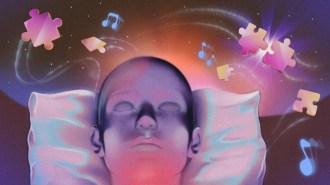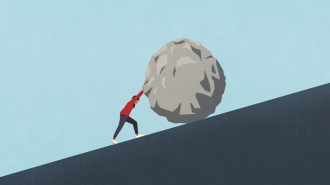Bad acts spark a ‘cheater’s high’
People get a charge out of running victimless scams
People who act unethically without harming an obvious victim — think plagiarizing on a term paper or stealing office supplies at work — get a buzz immediately after their transgressions, a new study suggests.
The existence of this “cheater’s high” challenges influential theories holding that any wrongdoing triggers guilt, shame or remorse, say psychologist Nicole Ruedy of the University of Washington in Seattle and her colleagues. Although people expect to feel guilty after breaching ethics, cheaters temporarily bask in the glow of having gotten away with forbidden acts, the researchers propose September 2 in the Journal of Personality and Social Psychology.
That won’t surprise shoplifters, joy riders and con artists who make no secret of savoring their swindles. But scientists have largely ignored the emotional upside of unethical behavior. Immediate emotional payoffs may reinforce certain types of offenses, Ruedy says.
Her team found that college students and volunteers recruited online predicted that they or others would feel bad if they were to cheat on a laboratory task or pad a time sheet at work to earn a bonus.
Yet those forecasts didn’t pan out in a new experiment where 179 participants unscrambled as many of 15 words as possible in four minutes. Every correct word was worth one dollar. Work sheets were stapled on top of two sheets of carbonless copy paper inside a folder. Upon finishing, volunteers tore off their work sheets and handed the folder to a researcher, not knowing that they had forked over a record of their responses.
Participants then used an answer sheet to check their own work in private before turning it in. Comparisons to copy paper responses showed that 71 volunteers cheated by inserting additional words from the answer sheet.
Afterward, cheaters on average reported a larger boost in excitement and other positive feelings than their honest peers did, with no change in negative emotions.
Further experiments indicated that a cheater’s high didn’t require financial rewards. Positive feelings even occurred among volunteers who didn’t actively cheat but were randomly assigned to solve problems with a partner who lied about the duo’s performance.
The biggest mood boost appeared among participants who were told that researchers couldn’t check the accuracy of the word scramble scores.
Low-stakes deceptions may yield a cheater’s high, but high-stakes ruses probably cause a complex emotional aftermath, comments psychologist Kurt Gray of the University of North Carolina at Chapel Hill.
“Contrast stealing a pen from work with embezzling thousands of dollars,” Gray says. “The latter may be accompanied by significant fear, guilt and paranoia.”







